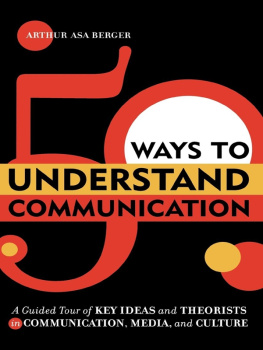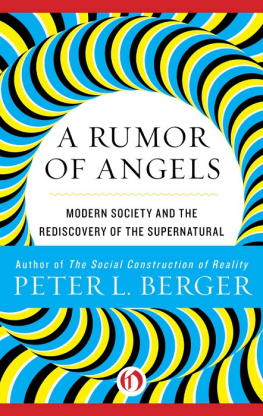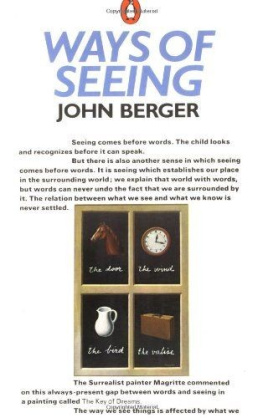First published 1987 by Transaction Publishers
Published 2017 by Routledge
2 Park Square, Milton Park, Abingdon, Oxon OX14 4RN
711 Third Avenue, New York, NY 10017, USA
Routledge is an imprint of the Taylor & Francis Group, an informa business
Copyright 1987 by Taylor & Francis.
All rights reserved. No part of this book may be reprinted or reproduced or utilised in any form or by any electronic, mechanical, or other means, now known or hereafter invented, including photocopying and recording, or in any information storage or retrieval system, without permission in writing from the publishers.
Notice:
Product or corporate names may be trademarks or registered trademarks, and are used only for identification and explanation without intent to infringe.
Library of Congress Catalog Number: 86-4286
Library of Congress Cataloging in Publication Data
Television in society
Collection of articles from Society magazine
Introd.
Bibliography: p.
1. Television broadcastingSocial aspects. I. Berger,
Arthur Asa, 1933
PN1992.6.T417 1986 302.2345 86-4286
ISBN 13: 978-0-88738-109-6 (hbk)
Contents
Arthur Asa Berger
Television Commercials
L. Patrick Devlin
Arthur Asa Berger
Events and Images
Daniel Dayan and Elihu Katz
John H. Barnsley
Rita J. Simon and Fred Fejes
Television Series
Roger L. Hofeldt
Michael Schudson
David P. Rabovich
Herta Herzog Massing
Violence and Television
David Pearl
Alan Wurtzel and Guy Lometti
Steven H. Chaffee, George Gerbner, Beatrix A. Hamburg, Chester M. Pierce, Eli A. Rubinstein, Alberta E. Siegel, and Jerome L. Singer
Alan Wurtzel and Guy Lometti
George Gerbner
John A. Schneider
Television and Education
Bert Briller and Steven Miller
George Gerbner, Larry Gross, Michael Morgan, and Nancy Signorielli
Susan B. Neuman
Lilya Wagner
Values and Social Control
Gaye Tuchman
Emile G. McAnany
Industry and Technology
Ben Stein
Ithiel de Sola Pool
News and Documentation
Eric Sevareid
Marvin Maurer
Robert Schmuhl
Arthur Asa Berger
Television and Society
This book comprises a collection of articles from SOCIETY magazine dealing with television in broadly sociological terms. That is, it considers how television both reflects and affects society, but it is much more than that. Television is, as has frequently been said, the medium everyone loves to hate. Television has been described as a cultural wasteland by some and by others defended as a medium which has brought to the masses more great art, music, dance, and drama than anything before its time.
In recent years scholars in many different fields have begun to consider television seriously and have been doing a great deal of work on the medium and matters related to it. There is a reason for this: statistics indicate that the average television set is on more than six hours in a typical household and the average person in the United States watches television more than three hours per day. Television may be seen as an entertainment mediumbut entertainment is by no means an insignificant matter. Our entertainments help socialize us, give us images of one another which can be stereotyped and misleading, and have significant political and economic consequences.
In ever increasing numbers, SOCIETY has published material on televisionboth in its Culture and Society section (where reviews of programs are generally found) and in the body of the magazine itself (where various issues are analyzed, often by scholars with different points of view). What is particularly useful about the material on television in SOCIETY is that it is both authoritative and accessible. Many of the most prominent scholars interested in television have written for SOCIETY and always in a manner that the intelligent reader will find understandable and thought-provoking.
Television in SOCIETY is divided into two sections. The first focuses on programming and deals with commercials, ceremonial events, important series (such as M*A*S*H and Lou Grant), significant programs (a production of Brave New World on television) and the images of the police on the medium. The second part of the book deals with important issues and topics related to the medium. Here we find discussions of matters such as the impact of television violence, values espoused in television, the impact of television on education, the significance of new technological developments, and the always thorny issue of freedom of the press.
Dealing With Television
There is a great deal of conflicting opinion about television. Here follows a list of some of the issues that are confronted in this book.
First, how do we study and interpret television? Sociologists, psychologists, psychiatrists, anthropologists, literary critics, moralists, theologians, and practically everyone else writes about television. What makes television so difficult to come to grips with is that the medium of television broadcasts various popular art forms (commercials, news shows, situation comedies, action-adventure programs). This raises important aesthetic questions (i.e., how effects are realized, how we judge performance) as well as social and political considerations.
What are the effects of television on individuals and society and how do we determine and measure them? Do we make a distinction between shortterm effects and long-term ones? Is it possible to make intelligent inferences about social and psychological effects without empirical data? This is not a trivial matter, by any means; for if we spend so much time watching television, there is good reason to assume that it does have a powerful impact on us. But how do we know this?
What is the role of television in our political and economic life? Is television the crucial factor in our selection of political figures? Is television generating consumer-lust and self-hatred and alienation, as many Marxist critics argue? And what role does new technology play?
Methods of Television Analysis
As we might expect, there are many different ways of analyzing television programs and the various issues and topics connected to the medium. Many of these techniques correspond roughly to academic disciplines, though it is not unusual to find a number of different methods being employed in a given essay.
First of all there are the empiricistsin all the social scienceswho base their conclusions on data usually derived from questionnaires or experiments. Much empirical work is, essentially, audience research and focuses more on the audiences of television programs than on the programs themselves.
Another group of scholars study uses and gratificationsthe uses audiences make of television programs and the gratifications they derive from them. From this perspective, watching television is not a simple and mindless process and is, in fact, an activity that is much more complicated than we might imagine. Some typical gratifications television offers include the desire to see heroes and heroines, villains and villainesses in action, the desire to have powerful emotional experiences, and the wish to reaffirm belief that morality is important and good ultimately triumphs over evil. People use television to learn about people and the world, to kill time, to find out about new products, or to keep informed on political and other areas of life.










